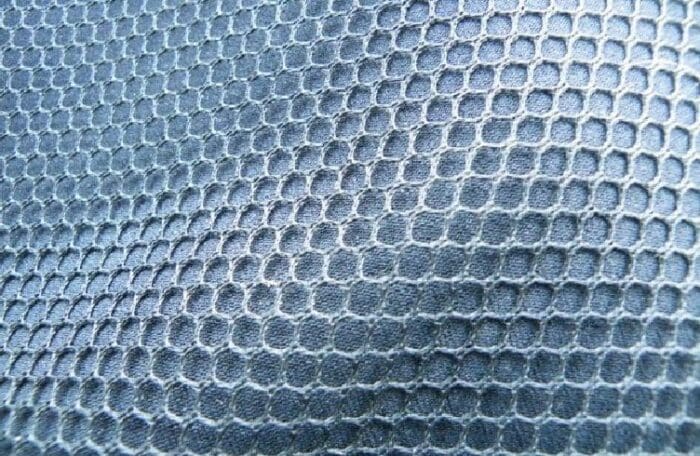

Nylon plastic is a strong, stiff engineering plastic with outstanding bearing and wear properties. Nylon offers a variety of uses and benefits, which have made it one of the most popular plastics today. Before we cover those uses and benefits, let’s take a closer look at what is nylon.
What is Nylon?
Today, nylon plastic is one of the most popular and widely used engineered materials. Versatile and flexible, one of the main benefits of nylon is that it’s a cheap and durable plastic to produce.
But what is nylon made of? Nylon is a thermoplastic made from petrochemicals. It’s a semi-crystalline plastic with both amorphous (unstructured) and crystalline (structured) regions.
Nylon is used across many industries, including agriculture, construction, clothing, sporting and food processing. It was actually originally produced as a sturdier and cheaper alternative to silk. People soon recognised the numerous benefits of nylon, which is now favoured over other materials in many industries.
So what are the benefits of nylon fabric and nylon plastic?
Main Benefits of Nylon
There are many benefits of nylon, no matter what type of product you are making.
- Nylon is durable
One of nylon’s main benefits is its strength and durability. Did you know, during World War II, nylon was often reserved solely for the war effort as it was so useful? Nylon plastic is a very sturdy material. It also has very high wear and abrasion resistance. Combine this with its high tensile and compressive strength and the fact it’s fire-retardant, and you’ve got one of the most durable plastics on the market. - Nylon is lightweight
Because nylon is a plastic, it’s very lightweight to produce. It’s said to be 1/7th the weight of most conventional materials. This makes it ideal for applications that require strength and strict weight restrictions. - Nylon doesn’t cost
Nylon plastic is man-made, not farmed or harvested. Because of this, the cost of producing nylon is quite low. Nylon fabric can even be woven to have the same feel as many high-cost materials, such as merino wool, for a fraction of the price. - Nylon is waterproof
“Is nylon waterproof?” is a question we’re regularly asked. And the answer is yes! Nylon is waterproof. Unlike many other materials, nylon forces moisture to the surface where it can evaporate. Because it doesn’t retain or absorb moisture, it’s less likely to grow mold or other fungi, saving you on cleaning costs and time. That’s why nylon plastic is often used for products that need an element of waterproofing, like shower curtains and climbing equipment. - Nylon is easy to wash
Because nylon is waterproof, it’s very easy to care for and wash. Nylon fabric resists shrinkage and wrinkles and is pleat retentive. Nylon plastic can also often be simply wiped clean or washed easily. - Nylon is easy to produce
Nylon is a simple material to produce. It’s fast drying and it can be either pre-coloured or dyed into a colour of your choice. It also has a low moisture absorbency. These benefits of nylon make for easy machining and a simple production process.
Nylon Variations
There are multiple types of nylon, which are typically labelled by numbers that relate to the material’s molecular structure. The most common types available are Nylon 6 and 6/6, but there are also other varieties for specific uses of nylon.
- Nylon 6
Nylon 6 is usually made into rod, tube and sheet formats using a liquid casting process. This is the most cost-efficient method of production. It also offers greater flexibility, as near net or irregular moulds can be created to make custom items. This is useful for manufacturing parts that would yield poorly from standard sheet, rod or tube stock. - Nylon 6/6
Nylon 6 and Nylon 6/6 have very similar mechanical, thermal and electrical properties. Nylon 6/6 is made by melting solid pellets of the polymer and processing them through a thermoplastic extruder. Extrusion is a fast and economical method for making a small diameter rod, tube and thin sheet. Unlike Nylon 6 stock shapes made by casting, extruded Nylon 6/6 sheet, rod and tubing can be manufactured to any length. This can be an advantage for yielding finished parts at a lower cost. - Nylon with Metal Core
Nylon with metal core, referred to as Nylon billets, can be produced into many different machinery components including rollers, gears, sprockets and augers. In power transmission applications, NYMETAL® billets combine the performance advantages of nylon and metal into one cohesive unit. - Graded Nylon
Nylon can be made in a number of speciality formulas. Molybdenum disulphide-filled (MOS2) and oil-filled nylons have the benefit of enhanced wear properties, often eliminating the need for external lubrication. Heat stabilised nylon withstands higher operating temperature and can be made available in glass-filled grades for enhanced strength. Nylon can also be made in FDA-compliant grades for direct food contact.
Common Applications of Nylon
With the many benefits of nylon, it’s no surprise that its uses are numerous. Nylon fabric and nylon plastic can be found across the agriculture, sporting, automobile, construction and food production industries, among many others. 10 key uses of nylon include:
- Nylon rope
- Plastic fasteners and machine parts
- Stockshapes
- Vehicle parts
- Cookware
- Fabric
- Fishing line
- Carpets
- Food packaging
- Hosiery
How to Order Custom Nylon Products
Nylon is a strong, durable, water resistant and flexible plastic that has many uses. Consider how nylon could work for you in your next project. Are you looking for expert plastic fabrication in Perth? Get a quote online or call us on (08) 9353 3477 for professional advice and service.


10 Mind-Blowing Applications of Plastic You Never Knew Existed
Read article

